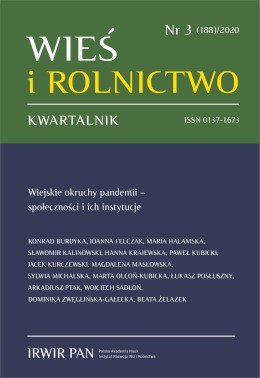A Social Picture of Everyday Life in the Country in Diaries from the Time of the Corona virus
DOI:
https://doi.org/10.53098/wir032020/09Keywords:
coronavirus, Covid-19, pandemic, country, diaries, everyday lifeAbstract
The aim of the article is to present preliminary conclusions from the analysis of the material gathered in “Everyday life in the time of corona virus” diary writing contest. In the article we focus on how the Polish countryside was presented in the diaries on the Covid-19 pandemic and how the pandemic influenced everyday life of the rural population. In the first part we present the methodological aspects of the contest held jointly by SGH (Warsaw School of Economics) and UMK (Nicolaus Copernicus University) between 23 March and 19 November 2020 and outline our chosen sample of diaries by country-dwellers and those connected to the country by their family ties. Then we discuss key motifs that predominated in these diaries: (1) portraying the countryside as an asylum and oasis of security; (2) the emergence of fears, tensions and prejudice towards strangers; (3) re-evaluation of relations in rural communities and (4) changes in everyday functioning in the countryside and challenges to basic activities.
References
Błędowski P., Karwacki A. (2020). Pamiętniki bezrobotnych 2017. Analiza fenomenu bezrobocia we współczesnej Polsce z perspektywy polityki społecznej i socjologii – wprowadzenie. Studia Socjologiczne 1 (236), 131–134.
Błędowski P., Kubicki P., Posłuszny Ł. (red.) (2019). Pamiętniki bezrobotnych, tom 1: Doświadczenie bezrobocia i trajektorie wykluczenia z perspektywy polityki społecznej i socjologii. Warszawa: Oficyna Wydawnicza Szkoły Głównej Handlowej.
Capano G., Howlett M., Jarvis D., Ramesh M., Goyal N. (2020). Mobilizing policy (in) capacity to fight COVID-19: Understanding variations in state responses. Policy and Society, 39 (3), 285–308. DOI: https://doi.org/10.1080/14494035.2020.1787628
Eurofound (2020). Living, working and COVID-19, COVID-19 series, Publications Office of the European Union, Luxembourg.
Foster EK. (2004). Research on gossip: Taxonomy, methods, and future directions. Review of General Psychology, 8 (2), 78–99. DOI: https://doi.org/10.1037/1089-2680.8.2.78
Goffman E. (2011). Instytucje totalne: o pacjentach szpitali psychiatrycznych i mieszkańcach innych instytucji totalnych (tłum. O. Waśkiewicz, J. Łaszcz). Gdańsk: Gdańskie Wydawnictwo Psychologiczne.
Kaczorowski J. (2019). Wykluczeni. O likwidacji transportu zbiorowego na wsi i w małych miastach. Przegląd Planisty, 4, 11–14.
Kłopot S., Szczepańska B. (2020). Religia i religijność wiejska. W: A. Kaleta, W. Knieć, W. Wincławski, G. Zabłocki (red.). Zbigniew Tadeusz Wierzbicki. Uczony i społecznik. Toruń: Wydawnictwo Uniwersytetu Mikołaja Kopernika (w druku).
Lu Yi, Jianting Zhao, Xueying Wu, Siu M. Lo (2020). Escaping to nature in pandemic: A natural experiment of COVID-19 in Asian cities. SocArXiv, 3 września.
Posłuszny Ł. (2017). Instytucje totalne dzisiaj: stan badań, krytyka, rekonfiguracje. Studia Socjologiczne, 4 (227), 121–145.
Roberto K.J., Johnson A.F., Rauhaus B.M. (2020). Stigmatization and prejudice during the COVID-19 pandemic. Administrative Theory & Praxis, 42 (3), 364–378. DOI: https://doi.org/10.1080/10841806.2020.1782128
Rzymski P., Nowicki M. (2020). COVID-19-related prejudice towards Asian medical students: A consequence of SARS-CoV-2 fears in Poland. Journal of Infection and Public Health, 13 (6), 873–876. DOI: https://doi.org/10.1016/j.jiph.2020.04.013
Stanny M. (2014). Wieś, obszar wiejski, ludność wiejska – o problemach z ich definiowaniem. Wielowymiarowe spojrzenie. Wieś i Rolnictwo, 1 (162), 123–138. DOI: https://doi.org/10.53098/wir.2014.1.162/07
Sulima R. (2014). Społeczne wyobrażenia wsi na przełomie XX i XXI wieku. Wieś i Rolnictwo, 2 (163), 57–63. DOI: https://doi.org/10.53098/wir.2014.2.163/04
Śpiewak R. (2012). Definiowanie kategorii „wieś” na początku XXI wieku, czyli o kłopotach badacza obszarów wiejskich. Wieś i Rolnictwo, 3 (156), 30–45. DOI: https://doi.org/10.53098/wir.2012.3.156/02











